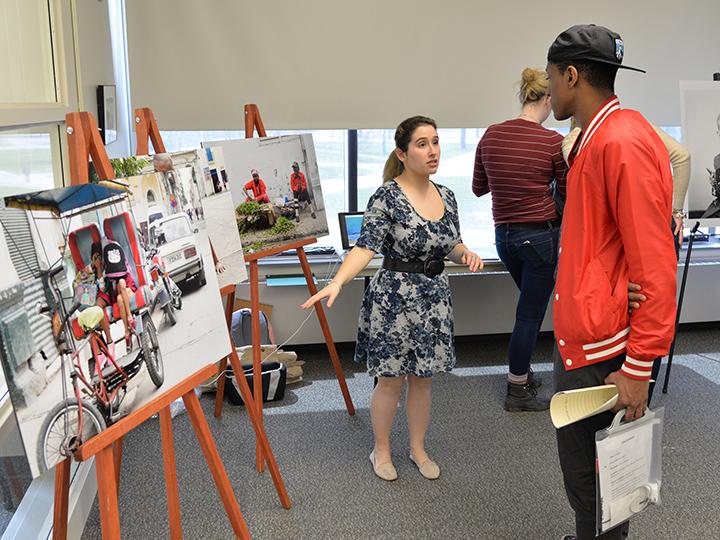'Walking interdisciplinarity' -- SUNY Oswego's annual Quest symposium, a cornucopia of scholarly research presentations and creative exhibitions across the college and its 110 programs, will take place April 4. Here, in 2016, then-senior graphic design major Samantha Kaye talks about her photos of contemporary Cuban culture with Sean Campbell, then a junior computer science major, during the Art Department Showcase at Quest.
Quest, the annual symposium celebrating scholarly and creative pursuits of undergraduate and graduate students, faculty and staff, on Wednesday, April 4, will unveil the college's first foray into an internationally known competition for graduate students.
Oswego will join just one other SUNY school on a list of more than 600 worldwide hosting Three-Minute Thesis (3MT), a competition originating with University of Queensland, Australia, aimed at improving students' ability to explain their research economically and effectively in what has been dubbed "lightning talks." SUNY Stony Brook also is listed on 3MT's website as a participant in competitions that, before 2017, were geared only for doctoral students.
"We are thrilled in Graduate Studies to be participating," said Dr. Kristen Eichhorn, dean of the division and lead coordinator this year for Quest. "We talk all the time about learning outcomes and skills acquisition. Students are going to be doing (expeditious presentations) on their job interviews and will point to experiences like this."
Since its inaugural year in 1980, Quest has encouraged research and creativity at SUNY Oswego through dozens of presentations, exhibitions and demonstrations each year of faculty-mentored student projects as well as those of faculty members themselves. Among other highlights, Quest features a display of scholarly posters -- with in-person explanations provided by the authors -- that routinely blankets the floor of Marano Campus Center arena.
"We talk a lot about experiential learning, and Quest provides a showcase," Eichhorn said. "This is a key pillar of what this institution is about. It is a great thrill to bring it to life this year, and it's certainly central to our mission. It promotes leadership, critical thinking, interdisciplinary problem solving. These are skills that are transferable."
Enriching collaborations
Doug Guerra, an English and creative writing faculty member who is among the organizers for Quest, says he enjoys and cultivates the "walking interdisciplinarity" that the day encourages.
"I know it's been useful for me to see the kinds of collaboration between faculty and students in other departments, and that there have been vital conversations sparked at panels in literary studies, for instance, when folks from history, philosophy or computer science have shown up," Guerra said. "The more people know about what others are working on, the more likely it is that someone -- whether it be faculty or students -- will recognize dimensions of their own work that might be enriched by collaboration."
The 2018 symposium has drawn more than 160 presentation proposals, ranging as wide as SUNY Oswego's 110 majors and programs -- from art to zoology -- and as deep as the Great Lakes. Here is a small sampling among proposals submitted by departments in the College of Liberal Arts and Sciences, School of Business, School of Education and School of Communication, Media and the Arts:
- A study about how the high water levels in Lake Ontario in the last year have impacted the sensitive dune environment on the lake's eastern end, boosting groundwater levels, increasing erosion and altering species' habitats.
- A panel discussion with participants in the School of Education's Teacher Opportunity Corps, funded by a five-year, $1.63 million grant, which seeks to attract and retain teacher candidates from underrepresented groups in high-need schools, particularly in urban areas.
- An evaluation of M&T Bank's equity, utilizing models created to forecast the stock price based on the bank's competitive advantages in its industry, its dividend payouts to shareholders and stock repurchases.
- Research on hair cortisol levels among people in Machala, Ecuador, to correlate with the incidence of such mosquito-borne viruses as dengue, chikungunya and zika in a study that could provide a more comprehensive understanding of disease transmission at the local level.
- A presentation on the resurgence of celluloid film for students and seasoned filmmakers, and the role film labs play in restoring the past and creating the future of cinema.
- A presentation on the oral transmission of tradition and knowledge and its intersection with music throughout the global era, to show that oral culture is still alive and well in the music of the modern world.
- A study assessing partisan and structural bias in coverage of the 2016 presidential campaign on three television networks: ABC, CBS and NBC.
- A thesis on Oswego County's high rate of teen pregnancy that seeks to answer the question, "If community members feel like active participants in their healthcare, know about available resources in their community and receive tools that can make access to these resources more possible, will they be more likely to engage in healthier practices, access available resources and share what they learned with others?"
And the 3MT competition, which since 2008 has grown to a series of competitions among more than 600 institutions in 65 countries around the world. At Oswego, students in master's degree programs will present their theses in three-minute "lightning talks," with only one static PowerPoint slide allowed and no other resources or props.
For more information on Quest and an upcoming schedule, visit oswego.edu/quest. Navigate to oswego.edu/graduate/3mt for more on the "lightning talks competition.




